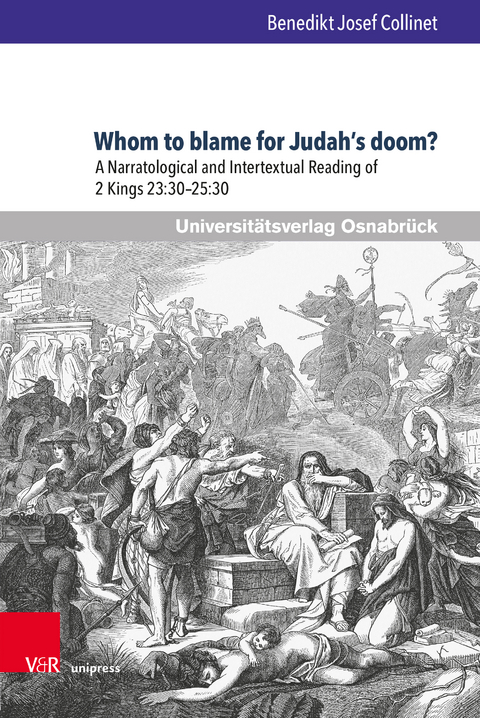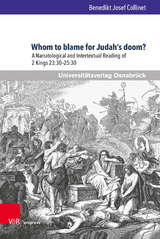Whom to blame for Judah’s doom?
A Narratological and Intertextual Reading of 2 Kings 23:30–25:30
Seiten
2023
|
1. Edition 2023
V&R unipress (Verlag)
978-3-8471-1344-7 (ISBN)
V&R unipress (Verlag)
978-3-8471-1344-7 (ISBN)
How did the Babylonian Exile come about? Was God to blame or was it the people themselves?
The last kings of Juda led God's people directly into exile and thus in the catastrophe of the destruction of the First temple. How did that happen? Who was responsible? What kind of role did God play in this drama? These questions will be addressed by Benedikt Josef Collinet. Unlike the narrative suggests, the kings were not the protagonists of the drama but the antagonists to God instead. God used the neighbouring peoples and Babel as tools of punishment. The reason for these punishments was the systemic covenant break of God's people. The consequences of these punishments can be read in Deuteronomy 28. The story is a composed deconstruction of divine salvation promises. The salvation gifts were withdrawn but the promises still remained. The people needed a new beginning that with reference to the exodus could only be indicated or prepared by pardoning Jehoiachin (2 Kings 25:27-30).
The last kings of Juda led God's people directly into exile and thus in the catastrophe of the destruction of the First temple. How did that happen? Who was responsible? What kind of role did God play in this drama? These questions will be addressed by Benedikt Josef Collinet. Unlike the narrative suggests, the kings were not the protagonists of the drama but the antagonists to God instead. God used the neighbouring peoples and Babel as tools of punishment. The reason for these punishments was the systemic covenant break of God's people. The consequences of these punishments can be read in Deuteronomy 28. The story is a composed deconstruction of divine salvation promises. The salvation gifts were withdrawn but the promises still remained. The people needed a new beginning that with reference to the exodus could only be indicated or prepared by pardoning Jehoiachin (2 Kings 25:27-30).
Dr. Benedikt Josef Collinet hat Katholische Theologie, Religionswissenschaft und Komparatistik in Trier, Innsbruck und Wien studiert. Er lehrt im Fachbereich Praktische Theologie der Katholischen Hochschule Mainz.
| Erscheinungsdatum | 12.01.2023 |
|---|---|
| Reihe/Serie | Osnabrücker Studien zur Jüdischen und Christlichen Bibel ; Band 008 |
| Übersetzer | Philip Sumpter |
| Zusatzinfo | with 3 figures |
| Verlagsort | Göttingen |
| Sprache | englisch |
| Original-Titel | Die letzten Könige von Juda |
| Maße | 160 x 237 mm |
| Gewicht | 515 g |
| Themenwelt | Religion / Theologie ► Christentum ► Bibelausgaben / Bibelkommentare |
| Geisteswissenschaften ► Religion / Theologie ► Judentum | |
| Schlagworte | Babylonian Exile • Deuteronomistic History • federation • First Temple • Intertextuality • Jeconiah • Kings • Narratology • Solomonic Temple • zedekiah |
| ISBN-10 | 3-8471-1344-5 / 3847113445 |
| ISBN-13 | 978-3-8471-1344-7 / 9783847113447 |
| Zustand | Neuware |
| Haben Sie eine Frage zum Produkt? |
Mehr entdecken
aus dem Bereich
aus dem Bereich
Buch | Softcover (2021)
De Gruyter (Verlag)
CHF 45,90
wie wir uns unsere spirituelle Heimat zurückholen
Buch | Hardcover (2024)
Patmos Verlag
CHF 27,95




